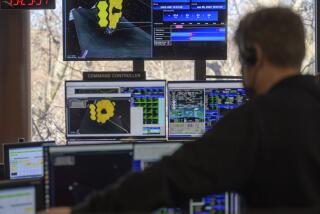Northrop Gets 1 of 3 AF Contracts
The Air Force has issued contracts worth more than $3 billion for production of three major military aircraft programs in the Los Angeles area.
Northrop announced Tuesday that it received a $2-billion contract last November for the top-secret Stealth bomber, which apparently represents some type of production award in the bomber program.
Separately, McDonnell Douglas announced Tuesday that it has received a $429-million award to begin production of the Navy T-45 training jet at its Long Beach-based Douglas Aircraft subsidiary. The award follows a $603.6-million award last week to Douglas to start production of the C-17 Air Force cargo jet.
The three programs are among the Pentagonâs most important military aircraft programs and will guarantee continued high aerospace employment locally through the 1990s.
Los Angeles-based Northrop, which plans to eventually build 132 Stealth bombers, now employs about 13,000 on the project at facilities in Pico Rivera and Palmdale; McDonnell will build 210 C-17s aircraft, employing a peak of 11,000 in 1990 or 1991, up from 6,000 already working on the program; the Navy plans to buy 300 T-45 aircraft, along with related training equipment, and employment on the program will peak this year at 1,000.
âThis commitment by the Air Force on the C-17 is very significant,â said Bob Clepper, C-17 program manager at Douglas. âWe believe it is the Air Forceâs intention to move this program into production. We are feeling very confident right now.â
The four-sentence announcement by Northrop was vague and inconclusive, although it marks one of the few official statements the company has ever been authorized by the Air Force to make about the Stealth bomber, formally known as the Advanced Technology Bomber or B-2.
The statement said: âThe U.S. Air Force today authorized Northrop Corp. to announce that the company was awarded a $2-billion contract for the Advanced Technology Bomber or B-2.â
The company did not specifically announce that the $2-billion award was for full-scale production of the new bomber, and industry sources said they doubt that the company has received Pentagon authorization to enter full-scale production, partly because the development program is believed to be about a year behind schedule.
âThis looks to me like we are blundering forward into grayness,â said aerospace analyst John Simon of the Seidler Amdec securities firm in Los Angeles.
âPolitical Reasonsâ
Analysts said the award is too small to represent a full-scale production contract. However, Northrop has clearly been conducting some sort of low-level production on the bomber for at least a year.
Aerospace subcontractors have told The Times that Northrop has been contracting for Stealth parts for at least a year and that subcontracts for parts for at least six aircraft have already been let.
Simon said he believes that the Stealth bomber entered low-level production in 1987 and that the $2-billion contract is virtually meaningless as a major milestone in the program.
âThe data at this point only adds to the confusion,â he said. âThe only reason I can see for the release of the contract value is for political reasons back in Washington.â
Aerospace analyst Joseph Campbell of the Paine Webber investment firm said he does not believe that Northrop has received authorization yet to begin full-scale production of the bomber, and he also discounted the significance of the award, saying it is not large enough to signal full-scale production.
He added, âYou donât get excited until you see $8 billion or something like that.â
Campbell said that if Northrop is preparing to enter production, he would expect to see large increases in the companyâs revenue figures, which has not been the case in recent quarters.
An additional factor clouding the picture is that Northrop is responsible for administering the engine contracts, an unusual contracting arrangement. That means that at least some of the $2 billion would be going to General Electric, the engine supplier.
On the Douglas T-45 program, the contract for fiscal 1988 covers procurement of 12 T-45 Goshawk aircraft, one flight simulator and other related equipment.
The first C-17 cargo jet is scheduled to fly in August, 1990. The T-45 is a derivative of the British Aerospace Hawk trainer, which is now in service, and the first of Douglasâ new planes is scheduled to fly in March. BA will provide Douglas with major airframe components.
Simon, the Seidler Amdec analyst, said he believes that all three programs have solid enough political support in Congress and support within the military to survive expected future budget cutting.
More to Read
Inside the business of entertainment
The Wide Shot brings you news, analysis and insights on everything from streaming wars to production â and what it all means for the future.
You may occasionally receive promotional content from the Los Angeles Times.











